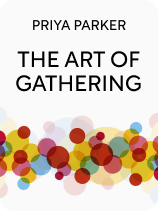

This article is an excerpt from the Shortform book guide to "The Art of Gathering" by Priya Parker. Shortform has the world's best summaries and analyses of books you should be reading.
Like this article? Sign up for a free trial here.
Are you shy around strangers? How do you talk to people at parties?
At a function where you don’t know people, it can be uncomfortable to strike up a conversation. But with Priya Parker’s book The Art of Gathering, hosts will learn how to get guests to step out of their comfort zone to connect with people on a deeper level.
If you want to know how to talk to people at parties, continue reading.
Being Comfortable Around Others
Want to know how to talk to people at parties without it being awkward? When we gather—whether at a party or conference—most of us put on a show: We present ourselves as strong and confident, and we hide our vulnerabilities. Parker argues that this is a missed opportunity to talk to people and connect with them. If your guests tell stories that reveal their vulnerability, other guests will feel more empathetic toward them. As a result, they’ll all feel more authentically connected to each other. At the very least, this authentic connection will make for a more memorable gathering; at its best, a deeper connection can allow for greater cooperation.
(Shortform note: In The Power of Vulnerability, Brené Brown elaborates on why vulnerability isn’t a sign of weakness and why being vulnerable increases the probability of authentic connection. Brown explains that although vulnerability requires sharing shame and emotion, it’s a sign of strength: It requires bravery to share something intimate with someone when you don’t know how they’ll perceive you. Brown adds that vulnerability enhances your connection with others because it builds trust: It’s nearly impossible to trust someone if you don’t know their motives, personality, or feelings—so to develop trust (and an authentic connection) with someone, you must be willing to be vulnerable.)
Parker shares several techniques for encouraging your guests to open up and be vulnerable when the gathering calls for vulnerability. Pre-gathering, consider inviting people who don’t know each other. People often feel more comfortable sharing intimate details with people in whom they’re not invested, as they don’t feel pressured to maintain a particular image.
(Shortform note: People may feel more comfortable divulging intimate details to strangers if you present it as an experiment, as psychologist Arthur Aron famously did. He asked strangers to ask each other 36 questions that demanded gradually increasing levels of vulnerability. Two of his subjects married each other, and several other couples who’ve asked each other those questions have also fallen in love.)
Parker recommends that you set the stage during the gathering. Begin the gathering by clearly explaining to your guests why you’re asking them to be vulnerable. Then, ask for stories. Specify that you want to hear not about their accomplishments but about something more authentic, such as life-defining experiences. If your guests know each other, request stories that nobody else in the room knows. Once people start sharing, share your story early, and make sure it’s slightly more intimate than those you want your guests to share. Your guests will cue off your example and share stories that are slightly less intimate than yours.
| How to Encourage Vulnerability at Work In Dare to Lead, Brené Brown presents an alternate method for encouraging vulnerability when leading a business gathering. Set the stage by acknowledging the uncertainty or risk of the situation. Speak openly about your emotions, but don’t overshare personal information in an effort to draw sympathy—this is manipulative and may backfire rather than provide the outcome you want. Then, instead of asking for stories, provide a space for your team members to discuss the situation. This space for discussion is essential: If you ask for your team’s input without letting them discuss the situation—such as by shooting down ideas you don’t agree with—they won’t trust you and so won’t express their concerns for fear of being criticized. |
Finally, don’t pressure your guests too much. As a host, you should encourage (but not demand) your guests to share; at one gathering, Parker created a rule that whoever shared last had to sing. However, some people won’t feel comfortable being extremely vulnerable in a group no matter what you do—and that’s OK. So choose a theme that invites interpretation; this will allow such people to be vulnerable within boundaries they’re comfortable with.
| How to Better Engage With Vulnerability No matter how open to interpretation the theme is, you (as a guest) may still be uncomfortable engaging with vulnerability. If so, Daring Greatly author Brené Brown suggests that you notice the defense mechanism you use to avoid vulnerability, and see if you can work through it. Brown recommends three possible solutions. If you notice that you experience happiness during the gathering but then immediately feel fear, express gratitude for that happiness—doing so will remind you that there is enough happiness to go around and you don’t need to be scared of losing it. If you think your story needs to be perfect before you share it, permit yourself to have it be bad. And if you try to avoid sharing—such as by deliberately deciding to go last, despite your fear of potential punishment (like the singing at Parker’s gathering)—practice mindfulness and strive to be present so that you can engage with both your own and your guests’ vulnerability. |

———End of Preview———
Like what you just read? Read the rest of the world's best book summary and analysis of Priya Parker's "The Art of Gathering" at Shortform.
Here's what you'll find in our full The Art of Gathering summary:
- How to make pre-planned gatherings more meaningful and engaging
- What to do before, during, and after any type of gathering
- Why the host should never relax during their event






